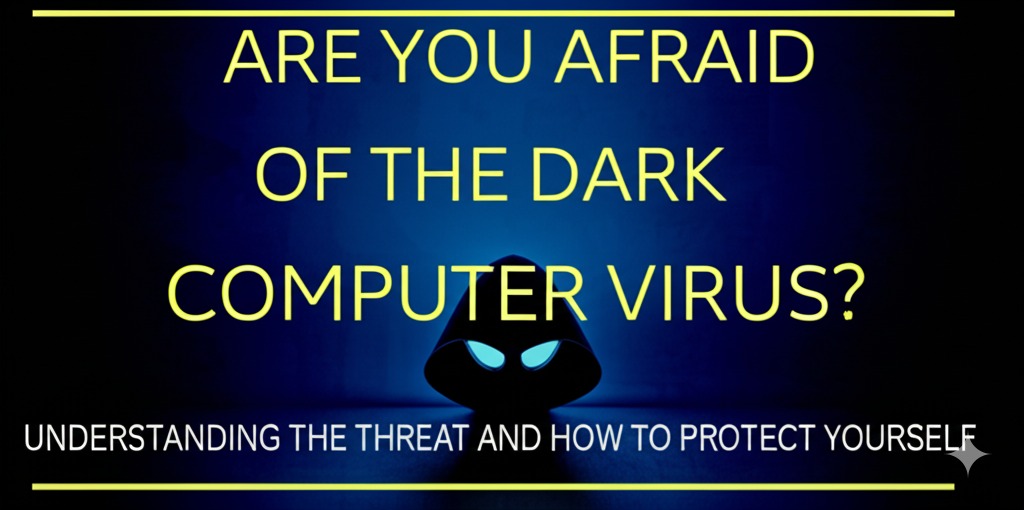In the digital age, we hear a lot about viruses, malware, and other cyber threats. But what happens when a computer virus strikes in the most mysterious and unsettling way? Enter the “Dark Computer Virus” — a term that sends shivers down the spine of anyone who has ever had their system compromised. While it may sound like something straight out of a horror movie, the reality of cyber threats can be just as alarming. In this article, we’ll explore what the Dark Computer Virus is, how it affects your system, and what steps you can take to protect yourself from this eerie and dangerous online menace.
What Is the Dark Computer Virus?
A New Breed of Cyber Threat
The term “Dark Computer Virus” isn’t a specific virus name; rather, it’s used to describe a category of malware that lurks in the shadows of your system. These viruses are often designed to operate under the radar, making them difficult to detect with traditional antivirus software. The key feature of the Dark Virus is its stealth and ability to go unnoticed for extended periods, allowing it to wreak havoc without alerting the user.
How It Works: The Silent Attacker
Dark Computer Viruses typically infect a system in a covert manner, often exploiting security vulnerabilities in outdated software or operating systems. Once inside, they can silently monitor your activity, steal personal data, and even hijack your computer’s resources for malicious purposes. They can spread through email attachments, infected websites, or by disguising themselves as legitimate software updates.
The Growing Threat of Dark Computer Viruses
Increased Sophistication of Malware
With the rapid advancement of technology, cybercriminals are constantly finding new ways to make viruses more sophisticated and harder to detect. Unlike traditional viruses that announce their presence by slowing down your system or causing noticeable crashes, Dark Computer Viruses may operate silently, allowing the attackers to steal sensitive information without triggering alarms.
Common Methods of Infection
Dark Computer Viruses can enter your system through various means. The most common include:
- Phishing Emails: Fraudulent emails with infected attachments or malicious links.
- Unpatched Software: Viruses that exploit vulnerabilities in outdated software.
- Malicious Websites: Websites designed to infect your system with viruses when visited.
- Trojan Horses: Software that appears to be legitimate but contains hidden malware.
The Risk of Data Theft and Ransomware
Once inside your system, Dark Viruses can steal sensitive data like personal information, financial details, and login credentials. Some types of Dark Viruses are designed to encrypt your files and demand a ransom for their release, a tactic known as ransomware. The consequences of a successful attack can be devastating, from financial loss to identity theft.
Signs Your Computer May Be Infected
If you suspect that your computer might have fallen victim to a Dark Virus, there are a few telltale signs to look out for:
- Sluggish Performance: Your computer runs slower than usual, even when you’re not using resource-intensive applications.
- Unexpected Pop-Ups: You receive frequent pop-ups or ads, even when you’re not browsing the web.
- Unknown Programs: Unfamiliar programs or processes running in the background.
- Suspicious Activity: Files or settings are altered without your knowledge or permission.
How to Protect Your Computer from Dark Viruses
1. Keep Your Software Updated
One of the simplest yet most effective ways to protect your computer is by ensuring all software is up-to-date. Cybercriminals often exploit vulnerabilities in outdated programs, so regularly installing security patches can prevent viruses from sneaking in.
2. Use Robust Antivirus Software
Investing in reliable antivirus software can help detect and remove malware, including Dark Computer Viruses, before they cause significant harm. Make sure your antivirus is set to run automatic scans and real-time protection.
3. Be Cautious with Email Attachments and Links
Phishing emails are one of the most common ways for viruses to spread. Always be cautious when opening email attachments or clicking on links from unknown sources. If you’re unsure about an email’s legitimacy, double-check with the sender before interacting with any attachments.
4. Regularly Back Up Your Data
Ransomware attacks can render your files inaccessible. To protect against this, regularly back up your important data to an external drive or a cloud service. If you fall victim to a ransomware attack, having backups ensures you won’t lose your vital files.
5. Use a Firewall
A firewall acts as a barrier between your computer and the internet, filtering out potentially harmful data. Enabling your firewall can help protect against external threats, including viruses attempting to enter your system.
6. Educate Yourself and Others
Understanding the dangers of Dark Viruses and educating those around you about cybersecurity best practices can go a long way in preventing infections. Cyber threats are constantly evolving, so staying informed about the latest risks and solutions is crucial for staying safe online.
What to Do if You’re Infected
If you believe that your computer has been infected by a Dark Computer Virus, immediate action is necessary to minimize the damage. Here’s what you should do:
- Disconnect from the Internet: Disconnecting from the internet can prevent the virus from spreading or communicating with external servers.
- Run a Full Antivirus Scan: Use your antivirus software to perform a full scan and remove any detected malware.
- Change Your Passwords: After the virus is removed, change your passwords for all online accounts, especially those that store sensitive information.
- Restore from Backup: If your files were compromised or encrypted, restore them from a backup.
Conclusion: Don’t Let the Dark Computer Virus Lurk in Your System
While the Dark Computer Virus might sound like something out of a horror movie, it’s a very real and growing threat in the digital world. The key to protecting yourself from this silent attacker is vigilance. Regular software updates, strong antivirus protection, and safe online habits are essential in safeguarding your system. If you suspect your computer has been infected, take action immediately to limit the damage.
By staying proactive and informed, you can keep your digital life safe from the dangers of Dark Viruses. Don’t let fear paralyze you; instead, take control and protect yourself from the lurking threats in the shadows. Stay safe, stay protected, and remember: knowledge is power in the fight against cybercrime.

Caleb Carlson is a contributing writer at Computer Site Engineering, specializing in computer technology, software trends, and hardware innovations. His articles simplify complex tech topics, making them accessible to readers of all levels.





